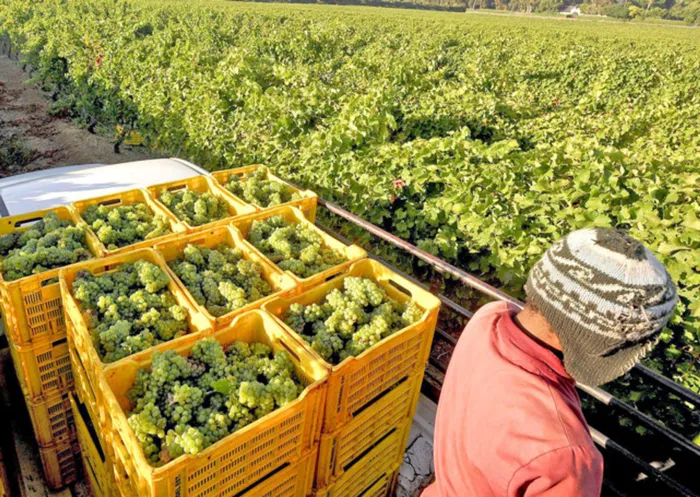Minimum wage cited to reduce inequality

CAPE TOWN, 2014/02/19, Pickers collected the baskets - De Grendel Winelands grape picking let by wine master, Charles Hopkins. Award winning South African wine farm, situated on the Durbanville wine route, 20 minutes from Cape Town. Reporter: Bianca Coleman / Picture: Adrian de Kock CAPE TOWN, 2014/02/19, Pickers collected the baskets - De Grendel Winelands grape picking let by wine master, Charles Hopkins. Award winning South African wine farm, situated on the Durbanville wine route, 20 minutes from Cape Town. Reporter: Bianca Coleman / Picture: Adrian de Kock
Johannesburg - The possible introduction of a minimum wage was this week cited as one of the possible solutions to address the widening inequality in South Africa and other unequal societies.
While South Africa remains one of the most unequal societies in the world, the latest Oxfam International report has painted a picture of the country’s rich continuing to make a more than decent living.
According to the report, titled Even It Up, the two richest people in the country have wealth equal to that of the poorest 26.5 million in South Africa.
Despite the strides made in reducing poverty, creating employment and providing social grants to the poor, the report concludes that inequality is actually higher than it ever was under apartheid.
“Between 1995 and 2006, the proportion of the population living in extreme poverty fell slightly to 17 percent. However, increases in population over the same period meant the total number of South Africans living in extreme poverty fell by just 102 000.
“Although real growth in GDP per capita was just under 2 percent, further progress on reducing poverty was hampered by South Africa’s extremely high, and growing, level of inequality,” states the report.
The report also slammed the high-income gaps between workers and senior executives in private companies, saying this was a major contributor to the inequality gap.
This was not only the case in South Africa, but also in Western countries like the UK, where companies were resisting paying their workers a minimum wage.
This year the UK top 100 executives took home 131 times as much as their average employee, yet only 15 of these firms have committed to paying their staff a living wage.
“In South Africa, a platinum miner would need to work for 93 years just to earn the average chief executive’s annual bonus. “Today’s combination of indecently low wages for the majority and scandalously high rewards for top executives and shareholders is a recipe for accelerating economic inequality,” states the report.
It concluded that one of the solutions was the introduction of a minimum wage, and urged governments across the world to agree to move minimum wage levels towards a living wage for workers.
One of the first steps towards this, according to the report, would be to include measures to narrow the gap between minimum wages and living wages in all new national and global trade agreements.
The sentiments were echoed by former government policy strategist and now executive director for the Mapungubwe Institute for Strategic Reflection, Joel Netshitenzhe.
“A national income policy should seek to regulate the gaps between ordinary workers and the middle strata on the one hand, and the senior executives on the other,” said Netshitenzhe.
He said while there was a need for an introduction of a minimum wage, it had to be coupled with efforts to force compliance.
“Consideration should also be given to a minimum wage, set at a level which affords workers a living wage. While there may be instances where mass absorption of the marginalised may dictate lower entry thresholds, such interventions should be temporary.
“Research has shown that reasonable increases to the minimum wage do not necessarily lead to job losses but that compliance in vulnerable sectors is often poor.
“As such, introduction of a minimum wage should be combined with requisite monitoring and enforcement capacity,” he said.
mogomotsi.magome@inl.co.za
Sunday Independent